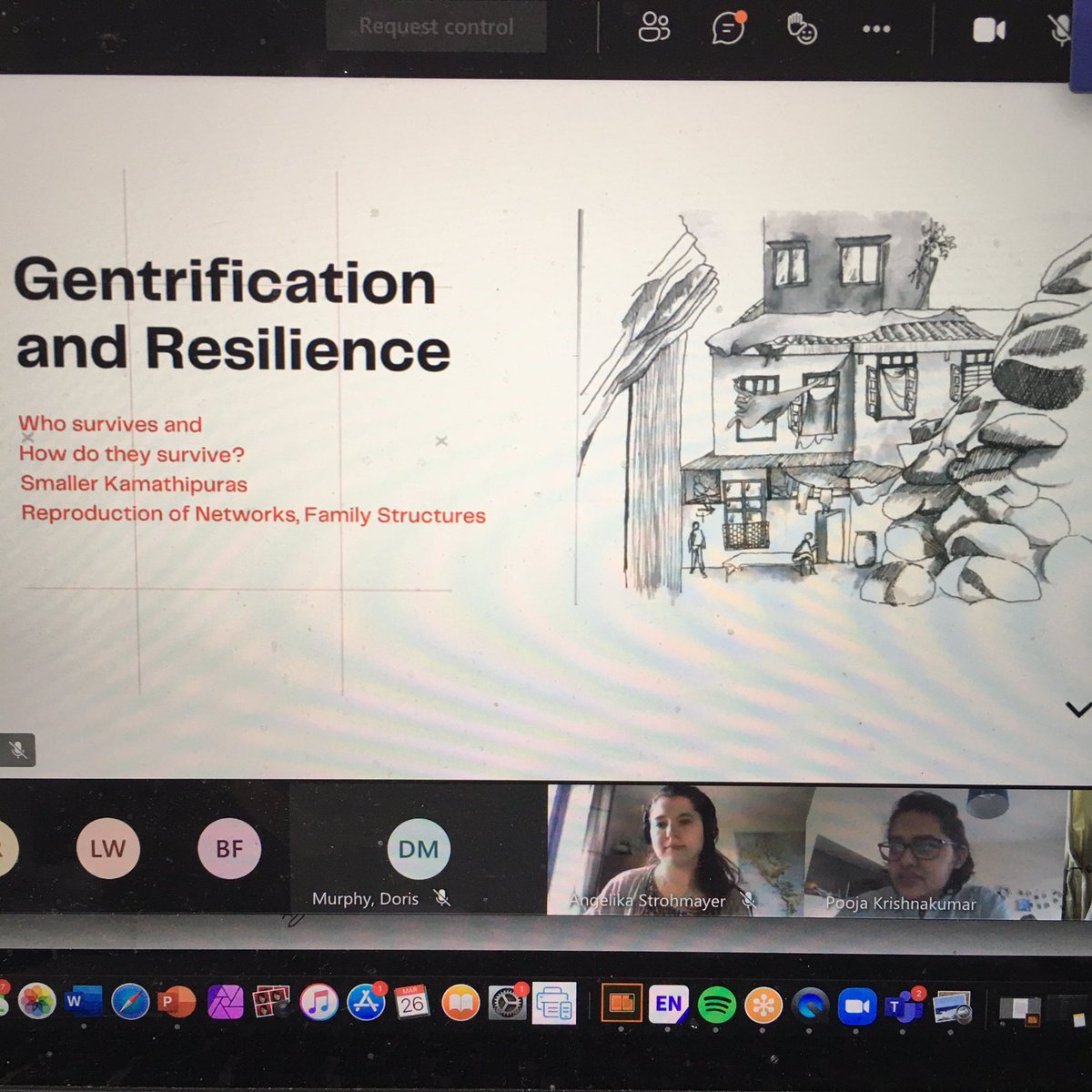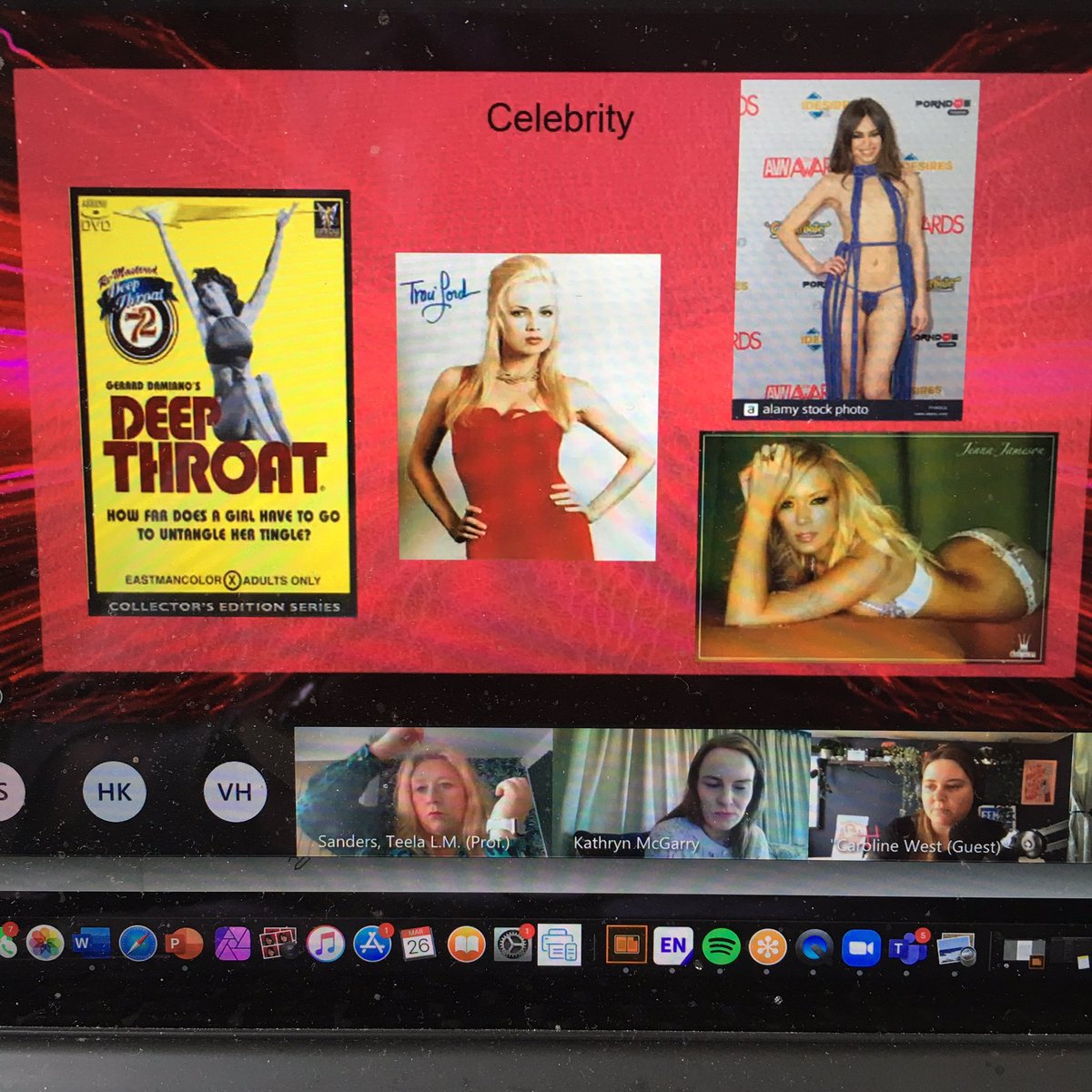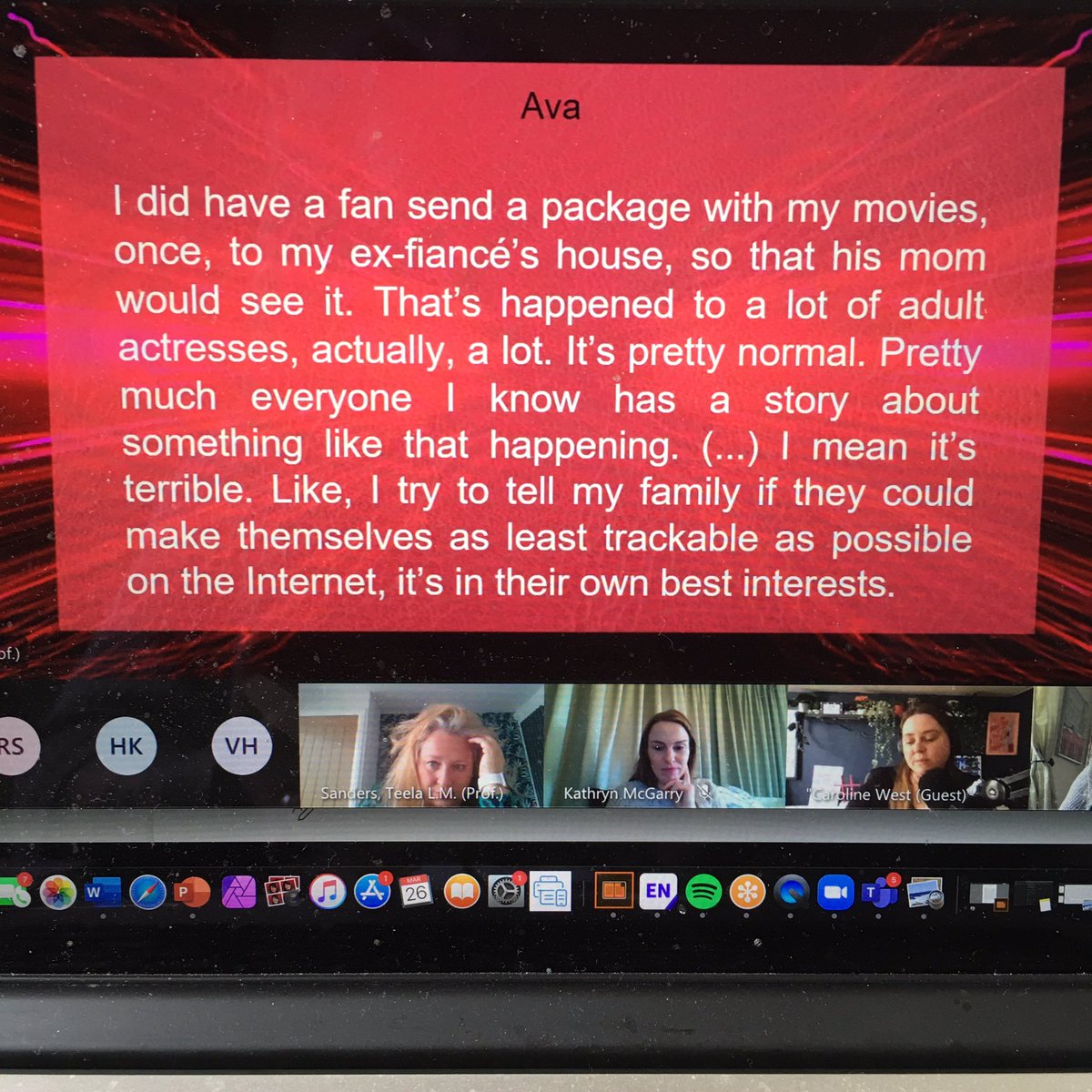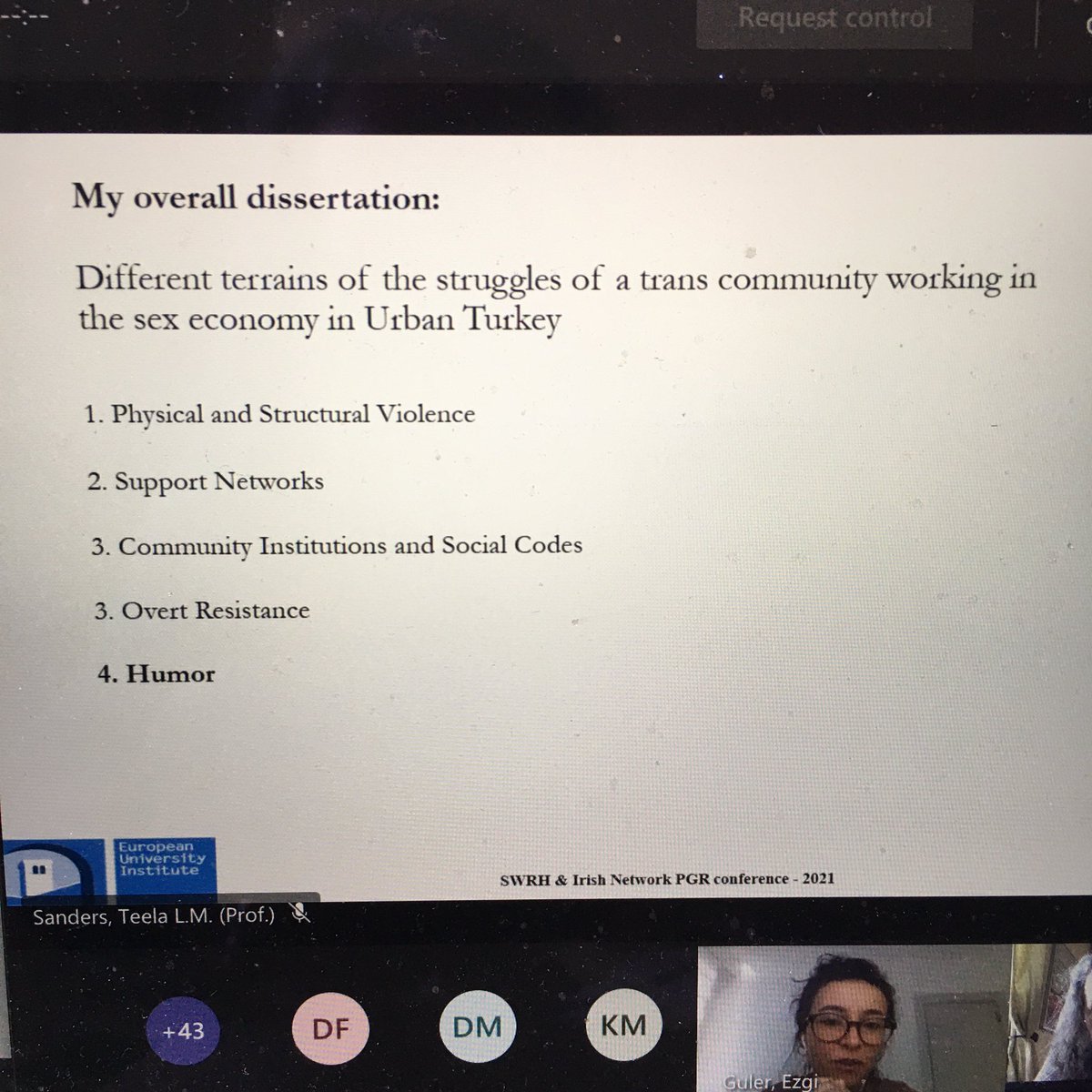
Welcome to our PGR sex work research conference 2021 with @sexworkreshub #sexworkresearch21
@ryan_paulryan @TeelaSanders and Kathryn McGarry open with introductions #sexworkresearch21
“Sorry we can’t show you all around beautiful Maynooth, but welcome” - Kathryn
Session 1: Angelika Stromayher is chairing and moderating.
“Sorry we can’t show you all around beautiful Maynooth, but welcome” - Kathryn
Session 1: Angelika Stromayher is chairing and moderating.
Up first is @aoife_kirk “Well I’m still here...” A feminist ethnography on the lived experience of sex workers in relation to the Criminal Law (Sexual Offences) Act, 2017, in the Republic of Ireland. #sexworkresearch21
Actually apologies,
Next is Laura Wallace. A secular Mariology? Exploring neo-abolitionist ideologies around sex work as a continuance of Catholic devotion in Ireland. #sexworkresearch21
Next is Laura Wallace. A secular Mariology? Exploring neo-abolitionist ideologies around sex work as a continuance of Catholic devotion in Ireland. #sexworkresearch21
Laura discusses how ingrained Catholic beliefs persist despite waining Catholicism. The role the Virgin Mary has played in Irish culture manifests in a puritanical national identity which has an effect on how undocumented sex workers are policed. 



Ingrained Mariology leads to abolitionist discourse that sees the migrant sex worker as a corrupting influence. 

Up next is @dottymurf SWAGS: Sex workers and An Garda Síochána - Policy, reality, and a sociological imaginary. #sexworkresearch21
Doris discusses the dichotomous discussion on sex work in academia.
She links it back to the previous presentation on Mariology in Ireland.

She links it back to the previous presentation on Mariology in Ireland.


The lack of a public policing policy allows for a wide variation in how it is applied in reality. @SWAIIreland and @uglymugsie were not consulted in the recent formation of the new Garda sex work policing unit. 

Doris talks about how the Gardaí are perceived by the sex workers they police based on current relevant research. 

Doris speaks on the effect of brothel keeping laws purported to protect sex workers and the changes that need to come into effect for sex workers to be safe. 



Next is Jo Krishnakumar. The Social Lives of Sex Workers in a Gentrifying Neighborhood: Towards an Ethnography of Kamathipura, India. #sexworkresearch21 

Jo is trained as a journalist and has been working around the sex worker movement for 5 years. She speaks on how she grew to challenge derogatory language she heard around her used to talk about sex workers.
Kamathipura has housed many of Mumbai’s sex workers since the 1800s. It has been gentrifying as of late. 



Much of current research focuses on HIV and current transgender laws which affect transgender sex workers. 

Jo speaks about how Kamathipura is portrayed in popular Bollywood films and how theses portrayals contrast with portrayals made by sex workers themselves. 

Jo speaks on how they became involved with sex worker organizations and how COVID-19 has steered the course of their research. 



Up first is @aoife_kirk “Well I’m still here...” A feminist ethnography on the lived experience of sex workers in relation to the Criminal Law (Sexual Offences) Act, 2017, in the Republic of Ireland. #sexworkresearch21
Aoife refers back to @dottymurf ‘s break down on recent sex work legislation and adds to the history of how it came to be. 

Aoife speaks on how sex working participants relayed the ways the law has failed “Well I’m still here,” and how sex workers’ voices were silenced in the lead up to the implementation of changes of the law. 

Primarily participants spoke about the variety of reasons they had come to engage in sex work. Primarily it was out of financial necessity. “if I didn’t go into sex work I would have been out on the street.” 

Participants spoke of their anger over the law, distrust of Gardaí and the negative ways clients changed after changes to sex work laws came into place.
“You’re pulling out a chair from underneath someone without putting something else in to replace it.”
Participants spoke about how changes to the law failed to address any of the reasons they entered into sex work.
Participants spoke about how changes to the law failed to address any of the reasons they entered into sex work.
Participants spoke of the importance of community to their wellbeing.
Current laws increase penalties and sentences for working together.
Aoife speaks of gratitude to @SWAIIreland for facilitating access to participants.
Current laws increase penalties and sentences for working together.
Aoife speaks of gratitude to @SWAIIreland for facilitating access to participants.

Aoife speaks of how participants are left increasingly vulnerable in the wake of changes to the law and how they deserve better.
Next is @bea_thechange ‘Reading in and writing out: sex work, biblical interpretation and the politics of in/decency.’ #sexworkresearch21
Bea speaks on how sex work is represented in theology and the importance of figures like Mary Magdalene to sex workers. 

Bea speaks of how sex workers are portrayed as untrustworthy and unsavory characters in biblical text.
She talks about the role of biblical interpreters and translators in negative portrayals of sex workers and it’s affect on sex workers today.
She talks about the role of biblical interpreters and translators in negative portrayals of sex workers and it’s affect on sex workers today.

Bea speaks about Mary Magdalene, her origins and dichotomous portrayal that stresses salvation and how her name has been attached to notorious Magdalene laundries where “fallen” women were saved, despite the lack of evidence she ever engaged in sex work. 

Bea speaks on the division that results from derogatory language used to separate sex workers from other women, portraying them as women to be saved. There are real world repercussions or sex workers from discussions of Mary Magdalene’s salvation. 





Session 2: Kathryn McGarry is chairing and @dottymurf moderates.
Next is @CarolineWest_IE Celebrity, Trophy Hunting and the ‘Porn Star.’ #sexworkresearch21
The experiences of women working in the US porn industry and how it relates to feminist discourse.
Caroline gives us a brief porn history.

The experiences of women working in the US porn industry and how it relates to feminist discourse.
Caroline gives us a brief porn history.


Caroline discusses dichotomous narratives of porn performers as both celebrities and victims.
She talks about how marketing has changed and the evolving role of social media in porn.

She talks about how marketing has changed and the evolving role of social media in porn.


Caroline speaks on the multiple skill sets needed by sex workers and the complexity of a performer’s life and how they are popularly portrayed simultaneously as both hustlers and victims. 

Caroline discusses the mixed experiences of performers with fans and the occasional violence inflicted on performers by both fans and protesters.
Some fans approach performers as life coaches and guides.
One participant spoke about the empowering experience of fan worship.


Some fans approach performers as life coaches and guides.
One participant spoke about the empowering experience of fan worship.



Caroline speaks about the collision between the worlds of performer and fan and the blurring of reality and how this affects the performer’s life positively and sometimes negatively. 







Next is Tess Herrmann. The interconnectivity of the sex industry: The relationship of lap dancers with the wider sex working community in the UK
#sexworkresearch21
#sexworkresearch21

Tess speaks on research studying “whorearchy” amongst sex workers, and how sex workers online speak about the ways this affects them, sometimes becoming internalised. 

Tess’s study aims to interview sex workers from different areas of sex work, presenting the findings after discussion with participants and strategising on how to navigate harmful effects of “whorearchy”amongst workers. 

Tess speaks on the role management can sometimes play pitting dancers against each other and about the complexity of the working lives of dancers and their interaction with other dancers.
Please share the survey which is still live.
Please share the survey which is still live.

Tess speaks on how the majority of participants to date relate to the term sex worker and the sex worker community and movement while a minority do not.
Next is @hokiestokie Timely Telling Tweets: Evaluation of a narrative review completed in real time utilising Amsterdam window sex worker tweets on the future legislation proposals of window prostitution. #sexworkresearch21 

Donna speaks on the role social media plays in allowing sex workers to have a voice. #nothingaboutuswithoutus
She has found that Amsterdam government has a clandestine approach to sex work policing.
She has found that Amsterdam government has a clandestine approach to sex work policing.
Donna speaks about the obstacles to researching sex work including translation costs and de-identification of data.
Her research ended before legislation was decided. Since then it has been decided by authorities to relegate workers to a designated area.
Her research ended before legislation was decided. Since then it has been decided by authorities to relegate workers to a designated area.
Donna speaks on how there is a need for a robust framework for researching sex work with much thought given to ethical considerations. 







Next is @ezgi_guler Humor in a serious business.
#sexworkresearch21
Ezgi speaks on how transgender sex workers in Turkey use humour to navigate adversity and the importance of community.


#sexworkresearch21
Ezgi speaks on how transgender sex workers in Turkey use humour to navigate adversity and the importance of community.



Ezgi analyzes the different types of humour and the importance of humour and the roles different types of humour plays in navigating an adverse existence. 





Ezgi speaks on how transgender sex workers use various types of humour to process traumatic experiences.
She speaks on humour as sometimes political and a vehicle for societal critique, as well as the ways laughter can be used to navigate shame, stigma and invisibility.

She speaks on humour as sometimes political and a vehicle for societal critique, as well as the ways laughter can be used to navigate shame, stigma and invisibility.


Next up is Erin Kilbride, from Frontline Defenders (a global human rights org), who is based in Mexico and supports sex worker rights defenders
Erin explains she supports people who are tortured or disappeared because of their human rights work
Erin explains how sex work human rights defenders are often left out of human rights defense worldwide
Erin notes that sex worker and sex workers human rights defenders have different needs to other human rights defenders, and a lot of organisations in this area have been lacking in this area, more education and training needed
Erin talks about the split between being a worker whole being an activist, and the demands on time and logistics
Erin outlines how organisations who support decrim often face abuse, but people are starting to listen more to sex workers and look at quality sex work research
Erin outlines how some police profile sex worker rights defenders who are contacts for arrested sex workers, and therefore they can subject them to violence, including sexual violence
Erin outlines that these defenders have been forced to have sex with police to gain the release of other sex workers, or put in cells with more violent prisoners
Erin outlines how an intersectional and inclusive approach is needed when it comes to organisations supporting human rights defenders in the area of sex work rights
Next up is Marhan Wijers, who is talking about sex worker rights and human rights, with a look at the German experience
*sorry, that is Marjan
Marjan explains that the slogan "sex worker rights are human rights" arose in the 1970s, and notes the alliance between radical feminists and evangelical Christians
Marjan explains both side use human rights to advance their cause- antis advocate that sex work is a violation of human rights, sex workers claim that they need human rights and protection
Marjan outlines how sex, and "good" sexuality is wrapped up in a threat to social norms that regular who is engaging in the "correct" form of sex
Marjan states that sex workers become seminal spittoons
Marjan outlines how the binary of "voiceless victim" and "heartless happy hooker" does not serve the conversation well as it doesn't allow nuance
Marjan explores how some laws remove the option to consider sex work as work, and situates sex workers as victims only, and client s as perpetrators
Next up we have Danille Warden who is here to talk about sex worker rights in the UK, through naming it as work
Danielle discusses how the legal situation depends on whether strippers are treated as independent contractors or employees. She refers to the following legal case: uklabourlawblog.com/2020/04/30/dan…
Danielle draws comparisons between other jobs in the gig economy and sex work or stripping. She notes that the worker status approach is important for sex workers, but there are too many precarious workers in the UK for the regulatory framework to actually support this.
Question from the audience regarding digitally mediated sex work. Are sex workers who use online platforms to sell content included in this worker status? They are considered labourers, but it is a slightly different issue. There needs to be further discussion around unionising.
The next presenter is Nadine Gloss. Nadine is studying the intersection between sex worker professionalisation and sex worker activism. She observed profiS workshops and training seminars in Germany. #sexworkresearch21
#SWRH #ISWRN
#SWRH #ISWRN
Danielle discusses the focus on empowerment, solidarity, and confidence during profiS workshops. There was also a focus on data protection in the workshops. One issue with moving from profiS to sex work activism is that structural barriers to activism exist. #sexworkresearch21
Remarks made during the workshops suggested that there was antagonism between members of the sex work community, so more communication would support mobilisation.
profiS is funded by an AIDS organisation, which could perpetuate stigma of sex workers as public health risks.
profiS is funded by an AIDS organisation, which could perpetuate stigma of sex workers as public health risks.
@c_iglesiasv is up next, with a paper based on correlates of client-perpetrated violence against sex workers in Bogota. This paper uses quantitative research methods, considering macro-structural, community-level and environmental correlates.
#sexworkresearch21
#sexworkresearch21
@c_iglesiasv used previously collected data from 2,684 interviews with full service sex workers.
Police abuse was the highest correlate for sexual violence from clients. Sex workers who experience stigma were also more likely to experience sexual violence. #sexworkresearch21
Police abuse was the highest correlate for sexual violence from clients. Sex workers who experience stigma were also more likely to experience sexual violence. #sexworkresearch21
@c_iglesiasv: Where the sex worker contacted the client was not a predictor of sexual violence. Being a migrant did not yield significant results. Stigma is a strong predictor of client physical violence. There are managed areas in Bogota. #sexworkresearch21
@c_iglesiasv draws links between Colombia and @LBhailis's research on Mariology in Ireland, there are influences of religion and culture on the experiences of sex workers. #sexworkresearch21
Final speaker of this session is @rayfilar. They are arguing that sex worker activism forms an important part of Marxist feminist, focusing on @ProstitutesColl and @SexWorkHive. Today's presentation focuses on the UK context.
#SexWorkResearch21
#SexWorkResearch21
@rayfilar talks about what sex worker activism means in different organisations. Sex worker liberation is a core part of feminist history, but sex worker feminists are erased. The feminist canon often erases those outside the white, middle class, able bodied, cis hetero norm.
@rayfilar talks about the formation of @ProstitutesColl. They quote Selma James from ECP: "Either united we stand, or divided we die" in relation to Peter Sutcliffe (the Yorkshire Ripper). @ProstitutesColl work from a Marxist feminist approach, in line with Wages for Housework.
@rayfilar frames full service sex work as a form of precarious service work.
@SexWorkHive ran a mutual aid fund during Covid-19, in cooperation with other organisations.
They also talked about the suppression of sex worker liberation history.
#SexWorkResearch21
@SexWorkHive ran a mutual aid fund during Covid-19, in cooperation with other organisations.
They also talked about the suppression of sex worker liberation history.
#SexWorkResearch21
Final panel session of the conference under way with @r_searcey. Rachel researched the family business of sex work, and "intergenerational transmission of sexual exploitation". Rachel investigated the social capital regarding intergenerational sex work.
#SexWorkResearch21
#SexWorkResearch21
Next up is @zoeenya22, who is independently researching sex workers' access to healthcare. Zoe notes that there are barriers for sex workers such as stigma, making it less likely for sex workers to disclose their job to GPs or other healthcare workers.
#SexWorkResearch21
#SexWorkResearch21
@zoeenya22 compares the Irish situation to the situation in New Zealand, where sex work is mostly decriminalised.
#SexWorkResearch21
#SexWorkResearch21
@zoeenya22 inspired a great discussion regarding mental/other health services in Ireland, & which ones are anecdotally known to be supportive of sex workers. @GOSHHirl & @SHC_Cork named as +ive support services, but @ryan_paulryan notes "outing" fear around specialised services.
Next speaker is @jessicavanmeir who discusses feminist standpoint theory as it applies to sex work research.
Ambivalent feelings about sex work are reported by sex workers, some are negative, others positive.
#SexWorkResearch21
Ambivalent feelings about sex work are reported by sex workers, some are negative, others positive.
#SexWorkResearch21
@jessicavanmeir's research focused on sex workers in Argentina and Ecuador, and the multiplicity of feelings surrounding sex work, and the complexity of internalised stigma and shame. Discussion now around the religiosity of these communities, and the impact of that.
#SWRH
#SWRH
Final panellist of the day is @bondpeybond, who presents research on Dunedin, New Zealand. This research is based on a snap-shot of the indoor sex work industry in Dunedin in 2018. The research focused on 'parlour' work, known as brothels elsewhere.
#SexWorkResearch21
#SexWorkResearch21
@bondpeybond also interviewed private workers, but this paper focuses on 'parlour work'. Peyton investigated how the Prostitution Reform Act (PRA), and the @NZPC_ guidelines, are experienced in practice by sex workers. This included experiences with management.
#SexWorkResearch21
#SexWorkResearch21
@bondpeybond concludes that once socially situated legislation (e.g. PRA) is in place, it should not be changed by outsiders (e.g. by-laws). Best practice requires decriminalisation of sex work as a first step, followed by active engagement with sex workers about guidelines. 

Aha, @bondpeybond was our penultimate panellist (all of the alliteration), my mistake! Ultimate panellist now, @isa_bellamatos!
@isa_bellamatos uses an "Epistemic Injustice" framework to investigate sex work and the web of stigmatisation. Bella challenges academics to interrogate whether we are perpetuating injustice and stigma.
#SexWorkResearch21
#SexWorkResearch21
@isa_bellamatos investigates hermeneutical injustice and testimonial injustice. Both of these injustices pathologise sex work, and prioritise moralistic interventions. Bella uses the example of the academic focus on condom use, rather than communication about sexual health.
@isa_bellamatos talks about how researchers and partners of sex workers discredit and devalue the expert opinion and knowledge of sex workers. Bella suggests that including community stakeholder literature in academic research is vital. #SexWorkResearch21 

Closing remarks from @maggieoneill9, @NickMaiNormal, and @TeelaSanders. Maggie is delighted to have the chance for convivial scholarship, to create a radical sociological imaginary. Nick calls for the mainstreaming of migrants in sex work research and activism. #SexWorkResearch21 

@NickMaiNormal notes that the institutional ethical review process can have a litigation focus, rather than magnifying/centring the voices of research participants. @TeelaSanders talking about the excellent work done by Maggie and Nick, and how they are inspired by PhD students.
• • •
Missing some Tweet in this thread? You can try to
force a refresh



